discover
find,find out,discover等的区别

find ,invent ,find out ,discover有什麽区别(当发现讲)解答:1)discover指“发现”某种本来存在,而以前未被发现的事物或未为人所知的东西。
如:I discovered (that) she was a good cook. 我发现她是个烹饪好手/她很会烧菜。
2)invent指“发明”,即原来没有而后来发明创造的东西。
如:Edison didn''t discover electricity,but invented the light bulb.爱迪生不是发现了电,而是发明了灯泡。
3) find强调在经过“寻找”(look for)后“找的结果”(找到或找不到),又可以表示“(偶然地)发现……”;如:I found a watch on the road. 我在路上发现了一块手表。
I found my cat asleep in my bed. 我发现猫睡在我的床上。
4)find out 通常表示“弄明白,搞清楚,查明……”。
如The teacher wanted to find out who had broken the door.老师想查明是谁弄坏了门。
You will ________ what kind person he is some day.A. findB. find outC. observeD. discover答案是BA find 找到,发现的意思B find out 有弄清真相,找出, 发现, 查明(真相等), 认识到,弄清楚的意思做“发现”讲时,是指发现一种无形而隐藏的东西find 和find out 都可译做发现,但发现的过程不一样。
find是“偶然发现”或“没有困难或几乎没有困难地发现”。
如:He found a dead cat at the door. 他在门口发现一只死猫。
而find out 却是强调经过一番过程,经了解和查询而搞清楚,弄明白某一情况。
find_find_out_discover等区别
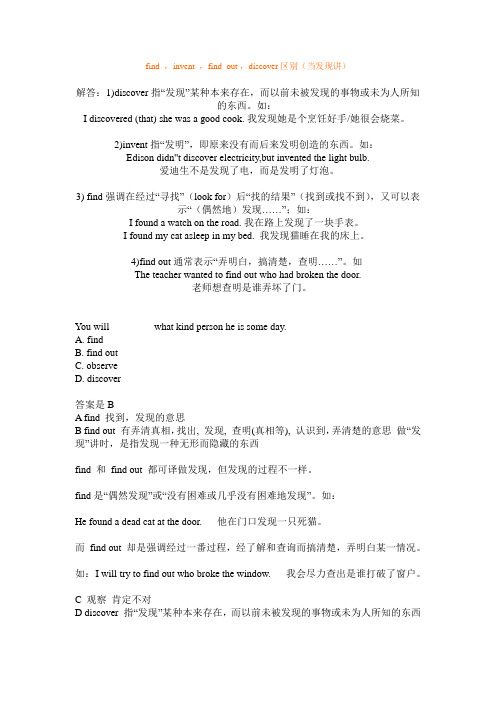
find ,invent ,find out ,discover区别(当发现讲)解答:1)discover指“发现”某种本来存在,而以前未被发现的事物或未为人所知的东西。
如:I discovered (that) she was a good cook. 我发现她是个烹饪好手/她很会烧菜。
2)invent指“发明”,即原来没有而后来发明创造的东西。
如:Edison didn''t discover electricity,but invented the light bulb.爱迪生不是发现了电,而是发明了灯泡。
3) find强调在经过“寻找”(look for)后“找的结果”(找到或找不到),又可以表示“(偶然地)发现……”;如:I found a watch on the road. 我在路上发现了一块手表。
I found my cat asleep in my bed. 我发现猫睡在我的床上。
4)find out 通常表示“弄明白,搞清楚,查明……”。
如The teacher wanted to find out who had broken the door.老师想查明是谁弄坏了门。
You will ________ what kind person he is some day.A. findB. find outC. observeD. discover答案是BA find 找到,发现的意思B find out 有弄清真相,找出, 发现, 查明(真相等), 认识到,弄清楚的意思做“发现”讲时,是指发现一种无形而隐藏的东西find 和find out 都可译做发现,但发现的过程不一样。
find是“偶然发现”或“没有困难或几乎没有困难地发现”。
如:He found a dead cat at the door. 他在门口发现一只死猫。
而find out 却是强调经过一番过程,经了解和查询而搞清楚,弄明白某一情况。
discover的用法
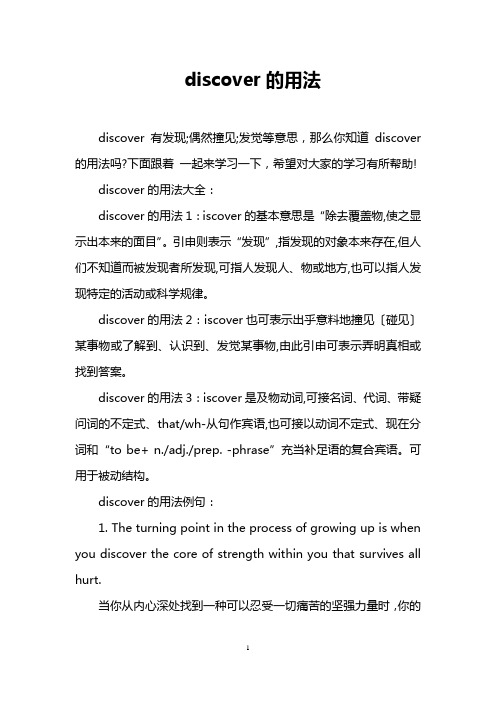
discover的用法discover有发现;偶然撞见;发觉等意思,那么你知道discover 的用法吗?下面跟着一起来学习一下,希望对大家的学习有所帮助!discover的用法大全:discover的用法1:iscover的基本意思是“除去覆盖物,使之显示出本来的面目”。
引申则表示“发现”,指发现的对象本来存在,但人们不知道而被发现者所发现,可指人发现人、物或地方,也可以指人发现特定的活动或科学规律。
discover的用法2:iscover也可表示出乎意料地撞见〔碰见〕某事物或了解到、认识到、发觉某事物,由此引申可表示弄明真相或找到答案。
discover的用法3:iscover是及物动词,可接名词、代词、带疑问词的不定式、that/wh-从句作宾语,也可接以动词不定式、现在分词和“to be+ n./adj./prep. -phrase”充当补足语的复合宾语。
可用于被动结构。
discover的用法例句:1. The turning point in the process of growing up is when you discover the core of strength within you that survives all hurt.当你从内心深处找到一种可以忍受一切痛苦的坚强力量时,你的成长历程就会出现飞跃。
2. Discover the delights and luxury of a private yacht.体验私人游艇的乐趣和奢华。
3. He was stunned to discover cost overruns of at least $1 billion.他震惊地发现花费至少超了10亿美元。
4. We happened to discover we had a friend in common.我们凑巧发现我们有一个共同的朋友。
5. The newly discover-ed notes are nothing more than Lang's personal journal.新发现的笔记只不过是朗的个人日志。
discover的用法和语法

discover的用法和语法One: Introduction to the Usage and Grammar of "Discover"Discovery is a fundamental human instinct that drives our curiosity and desire for exploration. It enriches our lives, expands our knowledge, and fuels scientific progress. The verb "discover" embodies this search for new insights and understanding. In this article, we will delve into the various ways in which "discover" can be used in different contexts and explore its grammar usage.I. Basic Definition of "Discover"The word "discover" originates from the Latin roots of dis- ("thoroughly") and cooperire ("cover"), meaning to uncover or reveal something previously unknown or unseen. It involves being the first to encounter or find something, whether it be an idea, place, object, or information.II. Direct Objects of "Discover"When using "discover," it is crucial to identify the direct object—an element that undergoes the action of discovery. Here are some examples:1. Discovering New Knowledge:- Scientists discovered a groundbreaking cure for cancer.- The archaeologists discovered ancient ruins buried beneath layers of soil.2. Discovering Places:- Christopher Columbus discovered America in 1492.- Explorers often dream about discovering uncharted territories.3. Discovering Secrets or Hidden Information:- She discovered her long-lost family history through extensive research.- The detective finally discovered who committed the crime after months of investigation.III. Indirect Objects with "Discover"In certain cases, you may want to specify who benefits from or receives the discoveries made using "discover." This requires adding an indirect object to complete the sentence structure:1. Discovering for Someone:- Marie Curie discovered radium, benefiting future generations with her findings.- He discovered a beautiful gift for his girlfriend at a local boutique.IV. Prepositions Used with "Discover"To provide additional information about how something was discovered or where it was found, prepositions are often used with the verb "discover." Here are some common prepositions that go hand in hand with "discover":1. Discovering In:- The scientists discovered a new species in the depths of the ocean.- Artists often discover inspiration in everyday life.2. Discovering Through:- She discovered her passion for photography through a school project.- We can discover our true selves through self-reflection and introspection.3. Discovering By:- Newton discovered the laws of gravity by observing an apple falling from a tree.- You can discover amazing recipes by experimenting in the kitchen.V. Tenses and Verb Forms for "Discover"The verb "discover" maintains regular conjugation patterns, changing based on tense and subject agreement:1. Present Tense:- I discover a new fact every day.- You discover hidden talents when you least expect them to arise.2. Past Tense (Simple):- He discovered a rare flower species during his trip to South America.- They discovered an ancient manuscript while exploring the ruins.3. Past Tense (Present Perfect):- We have discovered solutions to many environmental challenges.- The research team has discovered significant evidence supporting their hypothesis.4. Future Tense:- She will discover an exciting opportunity waiting for her after graduation.- The team is confident they will soon discover a breakthrough in their research.VI. Passive Voice Use of "Discover"The passive voice form of "discover" emphasizes the action performed upon the direct object instead of emphasizing who made the discovery:1. Passive Voice Examples:- The lost treasure was discovered by a young boy at the beach.- Many scientific breakthroughs were discovered accidentally throughout history.VII. Common Synonyms and Alternative ExpressionsWhile "discover" is commonly used, it is beneficial to explore its synonyms and alternative expressions to enhance your writing variety:1. Uncover2. Reveal3. Find out4. Stumble upon5. EncounterIn conclusion, the verb "discover" holds a significant position in our vocabulary, offering endless possibilities to express the act of finding, learning, and unearthing new information or experiences. By mastering its usage and understanding its grammar patterns, you can succinctly describe various discoveries without any ambiguity or confusion. Happy discovering!。
discover词汇辨析
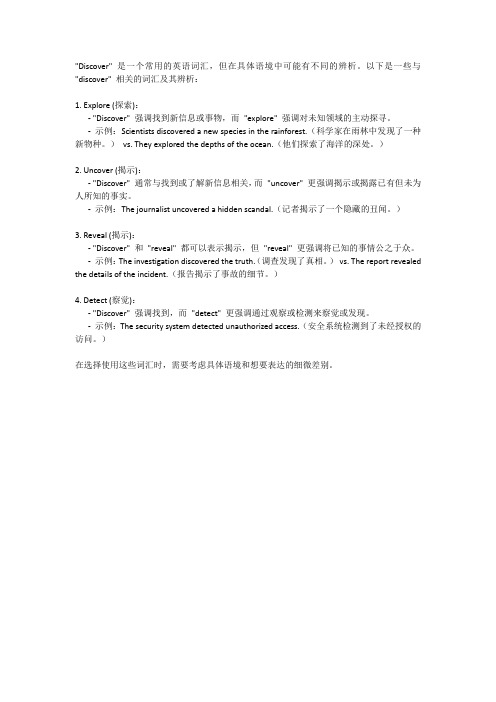
"Discover" 是一个常用的英语词汇,但在具体语境中可能有不同的辨析。
以下是一些与"discover" 相关的词汇及其辨析:1. Explore (探索):- "Discover" 强调找到新信息或事物,而"explore" 强调对未知领域的主动探寻。
- 示例:Scientists discovered a new species in the rainforest.(科学家在雨林中发现了一种新物种。
)vs. They explored the depths of the ocean.(他们探索了海洋的深处。
)2. Uncover (揭示):- "Discover" 通常与找到或了解新信息相关,而"uncover" 更强调揭示或揭露已有但未为人所知的事实。
- 示例:The journalist uncovered a hidden scandal.(记者揭示了一个隐藏的丑闻。
)3. Reveal (揭示):- "Discover" 和"reveal" 都可以表示揭示,但"reveal" 更强调将已知的事情公之于众。
- 示例:The investigation discovered the truth.(调查发现了真相。
)vs. The report revealed the details of the incident.(报告揭示了事故的细节。
)4. Detect (察觉):- "Discover" 强调找到,而"detect" 更强调通过观察或检测来察觉或发现。
- 示例:The security system detected unauthorized access.(安全系统检测到了未经授权的访问。
find,find out,discover等的区别

invent, find, find out, discover的区别1. discover意为“探索/发现”,表示“偶然”或“经过努力”发现客观存在的事物、真理或错误,即指发现原来客观存在但不为人所知的事物,也可表示发现已为人所知的事物的新的性质或用途。
如:Columbus discovered America in1492. 哥伦布1492年发现了美洲。
We soon discovered the truth. 我们很快就弄清了真相。
I discovered (that) she was a good cook. 我发现她是个烹饪好手/她很会烧菜。
2. invent意为“发明”,指通过劳动运用聪明才智“发明/创造”出以前未存在过的事物。
如:Who invented the telephone? 是谁发明电话的?He invented a new teaching method. 他发明了一种新的教学方法。
Edison didn''t discover electricity, but invented the light bulb.爱迪生不是发现了电,而是发明了灯泡。
3.find vt.(1)To come upon after a search. 找到,发现,感到,查明,得到,通过寻找遇到;强调在经过“寻找”(look for)后指找到或发现自己所需要的东西或丢失的东西,着重指找到的结果(找到或找不到),又可以表示“(偶然地)发现”;如:We've found oil under the South Sea. 我们已在南海发现了石油。
They finally found a way. 他们终于找到了办法。
Found the hidden leak in the pipe. 在烟斗上找到一个隐藏的缺口(2)To discover or ascertain through observation, experience, or study:发现,确定:通过观察、经验或研究发现或查明。
discover 用法
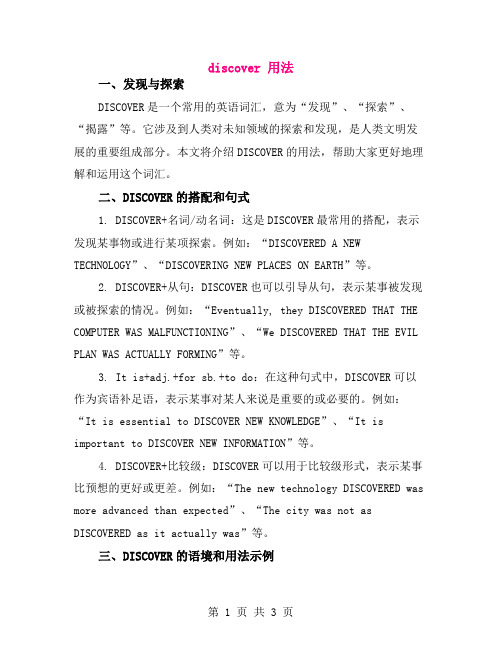
discover 用法一、发现与探索DISCOVER是一个常用的英语词汇,意为“发现”、“探索”、“揭露”等。
它涉及到人类对未知领域的探索和发现,是人类文明发展的重要组成部分。
本文将介绍DISCOVER的用法,帮助大家更好地理解和运用这个词汇。
二、DISCOVER的搭配和句式1. DISCOVER+名词/动名词:这是DISCOVER最常用的搭配,表示发现某事物或进行某项探索。
例如:“DISCOVERED A NEW TECHNOLOGY”、“DISCOVERING NEW PLACES ON EARTH”等。
2. DISCOVER+从句:DISCOVER也可以引导从句,表示某事被发现或被探索的情况。
例如:“Eventually, they DISCOVERED THAT THE COMPUTER WAS MALFUNCTIONING”、“We DISCOVERED THAT THE EVIL PLAN WAS ACTUALLY FORMING”等。
3. It is+adj.+for sb.+to do:在这种句式中,DISCOVER可以作为宾语补足语,表示某事对某人来说是重要的或必要的。
例如:“It is essential to DISCOVER NEW KNOWLEDGE”、“It is important to DISCOVER NEW INFORMATION”等。
4. DISCOVER+比较级:DISCOVER可以用于比较级形式,表示某事比预想的更好或更差。
例如:“The new technology DISCOVERED was more advanced than expected”、“The city was not as DISCOVERED as it actually was”等。
三、DISCOVER的语境和用法示例1. 探索未知领域:在描述人类对未知领域的探索时,可以使用DISCOVER。
discover的用法及短语

discover的用法及短语一、Discover的定义和基本用法Discovery是一个常见的英语词汇,它可以作为名词或动词使用。
作为动词时,discover表示“发现”、“找到”、“揭示”等含义。
而作为名词时,它指的是“发现物”。
1. 简单用法在最基本的用法中,discover可用于描述人们在某个时间或地点之后第一次了解或意识到某事。
例句:I discovered a new café in my neighborhood.(我发现了我社区里的一个新咖啡馆。
)She discovered that she had left her keys at home.(她发现自己把钥匙忘在家里了。
)2. 发现新地方或目的地Discover还可以指探索新地点、景点或目的地的过程。
例句:They discovered an amazing waterfall during their hike.(他们在徒步旅行途中发现了一个惊人的瀑布。
)We are planning to discover Europe next summer.(我们计划明年夏天去欧洲旅行。
)3. 发现新事实或知识除了发现新地方外,discover也可表示对新事实、知识、理论等有所获悉。
Scientists have discovered a new species of fish in the ocean.(科学家在海洋中发现了一种新的鱼类。
)He discovered that he had been misinformed about the situation.(他发现自己对情况的认识是错误的。
)二、Discover常用短语1. Discover something new这个短语指的是发现某事物之前并不存在于自己的知识或经验之中。
例句:She loves traveling because she always discovers something new.(她喜欢旅行,因为她总能发现一些新鲜事物。
discover造句简单初中
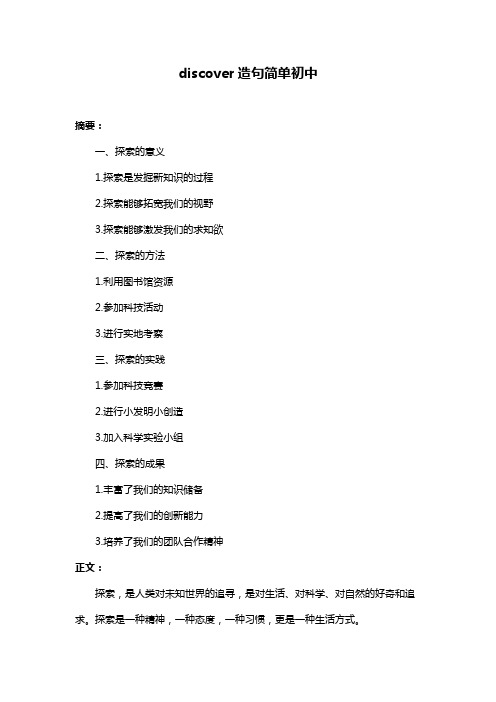
discover造句简单初中摘要:一、探索的意义1.探索是发掘新知识的过程2.探索能够拓宽我们的视野3.探索能够激发我们的求知欲二、探索的方法1.利用图书馆资源2.参加科技活动3.进行实地考察三、探索的实践1.参加科技竞赛2.进行小发明小创造3.加入科学实验小组四、探索的成果1.丰富了我们的知识储备2.提高了我们的创新能力3.培养了我们的团队合作精神正文:探索,是人类对未知世界的追寻,是对生活、对科学、对自然的好奇和追求。
探索是一种精神,一种态度,一种习惯,更是一种生活方式。
探索能够给我们带来什么?首先,探索是发掘新知识的过程。
通过探索,我们能了解到新的知识,新的观点,新的理论,这些都是我们提升自我,丰富人生的重要养分。
其次,探索能够拓宽我们的视野。
当我们走出舒适区,去接触和了解未知的事物时,我们的视野会得到拓宽,我们的世界也会变得更加宽广。
再者,探索能够激发我们的求知欲。
在探索的过程中,我们会遇到许多问题和困难,但正是这些问题和困难,激发了我们的求知欲,让我们更加积极地去寻求答案,去解决问题。
那么,如何进行探索呢?我们可以利用图书馆资源,阅读各类书籍,获取丰富的知识。
我们可以参加科技活动,亲身体验科学的魅力。
我们还可以进行实地考察,直接去接触和了解我们想要知道的事物。
在实践中,我们可以参加各类科技竞赛,通过解决实际问题,提升我们的创新能力。
我们也可以进行小发明小创造,通过动手实践,培养我们的实践能力。
此外,加入科学实验小组,也是一个非常好的选择,因为这样我们可以和志同道合的朋友们一起,共同探索科学的奥秘。
总的来说,探索不仅能丰富我们的知识储备,提高我们的创新能力,还能培养我们的团队合作精神。
discover词根记忆法

discover词根记忆法Discover词根记忆法是一种通过记忆、理解和应用单词词根来帮助学习者更好地记忆和应用单词的有效方法。
该词根意为“发现”,它可以作为许多单词的构成部分,包括discover、discovery、undiscovered等等。
接下来我将详细探讨如何使用Discover词根记忆法,并说明其优点。
首先,Discover词根记忆法的使用非常简单。
一旦掌握了该词根,学习者就可以立即将其应用到很多其他单词上。
例如,当学习者遇到一个不认识的单词时,他们可以立即考虑是否包含了该词根,并使用这个词根来猜测单词的含义。
这种方法可以大大降低学习者辨识生词的难度,并帮助他们更快地掌握新单词。
其次,Discover词根记忆法还可以帮助学习者更好地理解和应用单词。
例如,当学习者遇到一个新的单词时,他们可以将该词根与上下文结合起来,推断出单词的含义。
这种方法不仅可以帮助学习者记忆单词,而且可以帮助他们更好地理解单词,更好地应用单词。
最后,使用Discover词根记忆法还可以帮助学习者提高他们的单词量和词汇素养。
一旦学习者掌握了该词根,他们就可以在很多情况下正确理解和应用许多其他单词。
这将在很大程度上扩大他们的单词量,并有助于提高他们的词汇素养。
这对于学生学习任何一门语言是非常重要的。
总之,使用Discover词根记忆法是一种非常受欢迎的学习单词的方法。
它可以帮助学习者更好地记忆、理解和应用单词,并有助于提高他们的单词量和词汇素养。
有了这种方法,学习单词将变得更有趣、更有效、更有挑战性。
discover的用法

discover的用法discover有发现;偶然撞见;发觉等意思,那么你知道discover 的用法吗?下面跟着小编一起来学习一下,希望对大家的学习有所帮助!discover的用法大全:discover的用法1:iscover的基本意思是除去覆盖物,使之显示出本来的面目。
引申则表示发现,指发现的对象本来存在,但人们不知道而被发现者所发现,可指人发现人、物或地方,也可以指人发现特定的活动或科学规律。
discover的用法2:iscover也可表示出乎意料地撞见〔碰见〕某事物或了解到、认识到、发觉某事物,由此引申可表示弄明真相或找到答案。
discover的用法3:iscover是及物动词,可接名词、代词、带疑问词的不定式、that/wh-从句作宾语,也可接以动词不定式、现在分词和to be+ n./adj./prep. -phrase充当补足语的复合宾语。
可用于被动结构。
discover的用法例句:1. The turning point in the process of growing up is when you discover the core of strength within you that survives all hurt.当你从内心深处找到一种可以忍受一切痛苦的坚强力量时,你的成长历程就会出现飞跃。
2. Discover the delights and luxury of a private yacht.体验私人游艇的乐趣和奢华。
3. He was stunned to discover cost overruns of at least $1 billion.他震惊地发现花费至少超了10亿美元。
4. We happened to discover we had a friend in common.我们凑巧发现我们有一个共同的朋友。
5. The newly discover-ed notes are nothing more than Langs personal journal.新发现的笔记只不过是朗的个人日志。
【高中英语】常考词的语法与用法:discover, discuss

【高中英语】常考词的语法与用法:discover, discuss◆discover v.通常用作及物动词,主要用法有:1. 表示“发现”某一具体的东西,后接名词或代词作宾语。
如:Who discovered America? 谁发现了美洲?It was discovered among waste paper. 这是在废纸中发现的。
2. 表示“发现”某一情况,其后的宾语可以是:(1) 名词或代词。
如:We soon discovered the truth. 我们很快发现了事实真相。
My wallet is missing. I just discovered it. 我的钱包不见了,我刚刚发现的。
(2) 复合宾语。
如:We discovered her to be a good cook. 我们发现她很会煮饭。
I discovered him kissing my wife. 我发现他在吻我妻子。
(3) 疑问词+不定式。
如:We ha ven’t discovered how to imporve it. 我们还没找到如何改进它的办法。
(4) 从句。
如:I discovered that my wallet had been stolen. 我发现我的钱包被偷了。
Did you ever discover who did it? 你发现是谁干的了吗?◆discuss v.1. 表示“讨论”,是及物动词,其后直接跟宾语,不要按汉语习惯在其后使用介词on, about 等。
如:他拒绝讨论这个问题。
误:He refused to discuss about [on] the matter.正:He refused to discuss the matter.2. 其后接动词时,用动名词(不用不定式)。
如:They discussed selling the house. 他们商量过卖房子的事。
We’re here to discuss Ann’s joining the club. 我们这次碰头是为了谈谈安入会的事。
英语语法词汇详解discover和invent的区别

英语语法词汇详解discover和invent的区别【辨析】两者都指人们首先见到的新鲜事物而言,但含义有异。
请先看几个例句,Columbus discovered America but he did not explore the new continent.哥伦布发现了美洲,可是他没有去探索这个新大陆。
Modern astronomers have discovered a million such galaxies.现代的天文学家已发现了一百万类似的星群。
小结:discover发现,指初次看见本来已存在但以前未被发现的事物。
再看几个例句,Edison invented the electric light bulb.爱迪生发明了电灯泡。
A new-type stethoscope has yet to be invented.新型的听诊器有待发明。
小结:invent发明,是指创造前所未有的事物。
注意:有时候,invent还可作“捏造”解。
例:Don't you know a lie is always invented?谎言总是捏造出来的,难道你不知道吗?We must invent an excuse for being late.我们必须编造一个迟到的理由。
【拓词】discover的名词是discovery;invent的名词是invention. “发现者”是discoverer:“发明家”是inventor.【小试牛刀】Edison is said to________the first telephone.A.findB.discoverC.inventD.found解析:选C【辨析】先来看例句,He has been ill/sick for ten days. 他病了十天了。
She is taking care of his sick child. 她正在照顾生病的孩子。
【高中英语】常考词的语法与用法:discover, discuss

【高中英语】常考词的语法与用法:discover, discuss【高中英语】常考词的语法与用法:discover,discuss◆发现。
通常用作及物动词,主要用法有:1.它的意思是“发现”一个特定的事物,后跟一个名词或代词作为宾语。
例如:whodiscoveredamerica?谁发现了美洲?它是在废纸中发现的。
它是在废纸中发现的。
2.表示“发现”某一情况,其后的宾语可以是:(1)名词或代词。
例如:wesoondiscoveredthetruth.我们很快发现了事实真相。
我的钱包被偷了。
我喜欢发现编辑。
我的钱包不见了。
我刚找到。
(2)复合宾语。
如:我们发现他是个厨师。
我们发现她非常擅长烹饪。
idiscoveredhimkissingmywife.我发现他在吻我妻子。
(3)疑问+不定式。
例如:wehaven’tdiscoveredhowtoimporveit.我们还没找到如何改进它的办法。
(4)条款。
例如:idiscoveredthatmywallethadbeenstolen.我发现我的钱包被偷了。
你有没有发现是谁干的?你知道是谁干的吗?◆discussv.1.它的意思是“discussion”,是一个及物动词,后跟宾语。
根据中国人的习惯,不要在后面使用介词on、about等。
例如:他拒绝讨论这个问题。
错误:这里融合了对这件事的讨论正:herefusedtodiscussthematter.2.当后跟动词时,使用动名词(无不定式)。
例如:theydiscussedsellingthehouse.他们商量过卖房子的事。
我们将再次讨论加入俱乐部的问题。
我们这次见面是为了讨论安的会员资格。
注:其后虽不接不定式,但可接“疑问词+不定式”。
比较:我们讨论了要做什么我们讨论了应该做什么。
我们讨论了该怎么办。
3.其后可接whether引导的宾语从句,但一般不接if引导的宾语从句。
如:他们讨论了他们是否应该留在那里。
- 1、下载文档前请自行甄别文档内容的完整性,平台不提供额外的编辑、内容补充、找答案等附加服务。
- 2、"仅部分预览"的文档,不可在线预览部分如存在完整性等问题,可反馈申请退款(可完整预览的文档不适用该条件!)。
- 3、如文档侵犯您的权益,请联系客服反馈,我们会尽快为您处理(人工客服工作时间:9:00-18:30)。
Immediate Value
Flexibility
Maximize Productivity
Demonstration
EAI
Case Study
Ballston Spa Central School District • Situation
• • • The district is connected by a Wide Area Network (WAN) but data is not easily accessible Information is isolated within schools, buildings and databases, and is often inaccurate Disparate software packages are unable to share information
Enterprise Application Integration Increases Agility
Proven Quality
Control costs, resource requirements and complexity of integration projects Maximize value of existing technology investments
Immediate Value
Improve ability for you to: Automate Processes Integrate Information Sharing Control Costs Automate complex education processes easily Manage and monitor school processes Improve integration with faculty, students, parents and staff Capitalize on existing skill sets Minimize learning curve for new solutions
Results
Data is now accessible, and because it is entered once, it is much more accurate Creating reports is simplified because separate systems are able to share data Interoperability is no longer a problem, allowing schools to use the best solutions available
Results
Data can now be shared seamlessly between departments Processes that were duplicated are now completed in one step With the entire school on the Windows 2000 Platform, students and teachers now have the information they need at their fingertips
New School Imperatives
•
The connected school requires systems that
• • • • Are enterprise quality Are extremely flexible Leverage existing infrastructure investments Empower faculty, staff and students
Primary and Secondary Schools Key IT Concerns
• Provide the right information to the right parties quickly and efficiently through application integration • Bring legacy systems to the Web, including enterprise portal initiatives • Develop Web-based systems and on-demand student services • Optimize services for teachers, staff administrators, parents and students
Immediate Value
• • • SIF Compatible Utilizes existing technical infrastructure Seamless Information Sharing Across All Applications and Platforms
Proven Quality
•
Solution
• • • Deploy a Zone Integration Server for all communications between servers Allow the easy exchange of information by implementing the School’s Interoperability Framework Standard Utilize the complete Chancery Student Management Solution
Immediate Value
Flexibility
Maximize Productivity
Case Study Ocoee Middle School
• Situation
The Ocoee administration and faculty had a vision for their school: • Easy access to technology • Student email • A home-school connection for parents • Electronic student portfolios
Flexibility
Maximize Productivity
Maximizing IT Value
Proven Quality
Integrate with virtually any application or technology
Systems must integrate
Heterogeneous systems Legacy applications Isolated islands of data
Immediate Value •
Flexibility
Guaranteed “once only” delivery of documents
Quote
“A major part of my job is to gather information for state and local reporting--data that helps us get funding and helps us assess the needs of the district. As short a period as five years ago, we were collecting much of this data by pencil and paper. Using SIF will improve the efficiency and the accuracy of my reporting enormously. For example, now when a student is entered into the system from any application – student information or transportation – that information is accessible to everyone.”
Enterprise Application Integration
Key concerns
What our customers are saying
• • • Not getting maximum value out of current technology investments Need to make strategic decisions, faster Systems and processes not integrated together well enough to provide seamless exchange of information
•
Solution
• • • Implement the Schools Interoperability Framework so data can be shared seamlessly and used universally Deploy a Zone Integration Server (ZIS), a central clearing house for all SIF communications Utilizes of Extensible Markup Language (XML) format
-Dr. Helen Stuetzel, Director of Instruction, Ballston Spa
Flexibility
• Proven Quality • Standards-based
• • Supports SIF, EDI, XML, SOAP Ensures flexibility, interoperability with any member of the educational community
